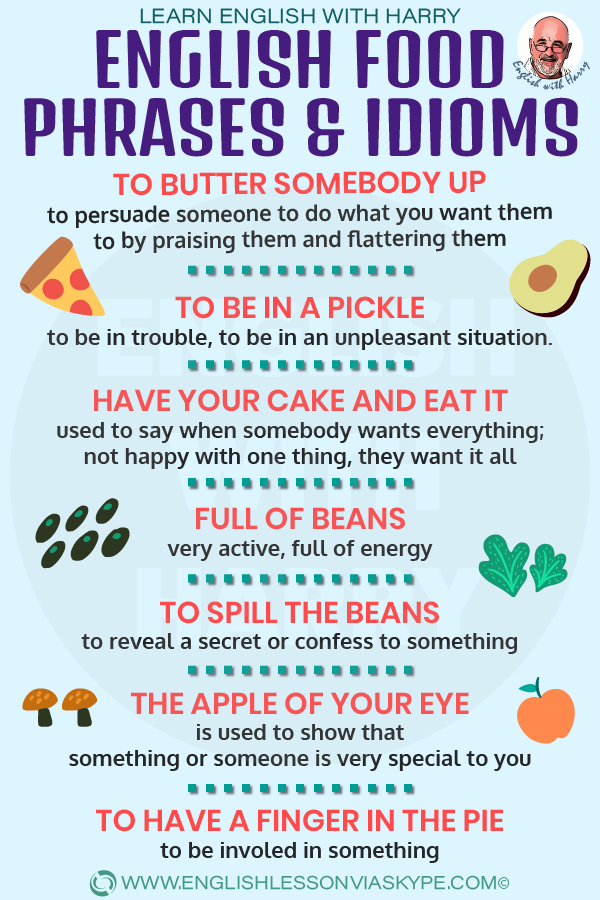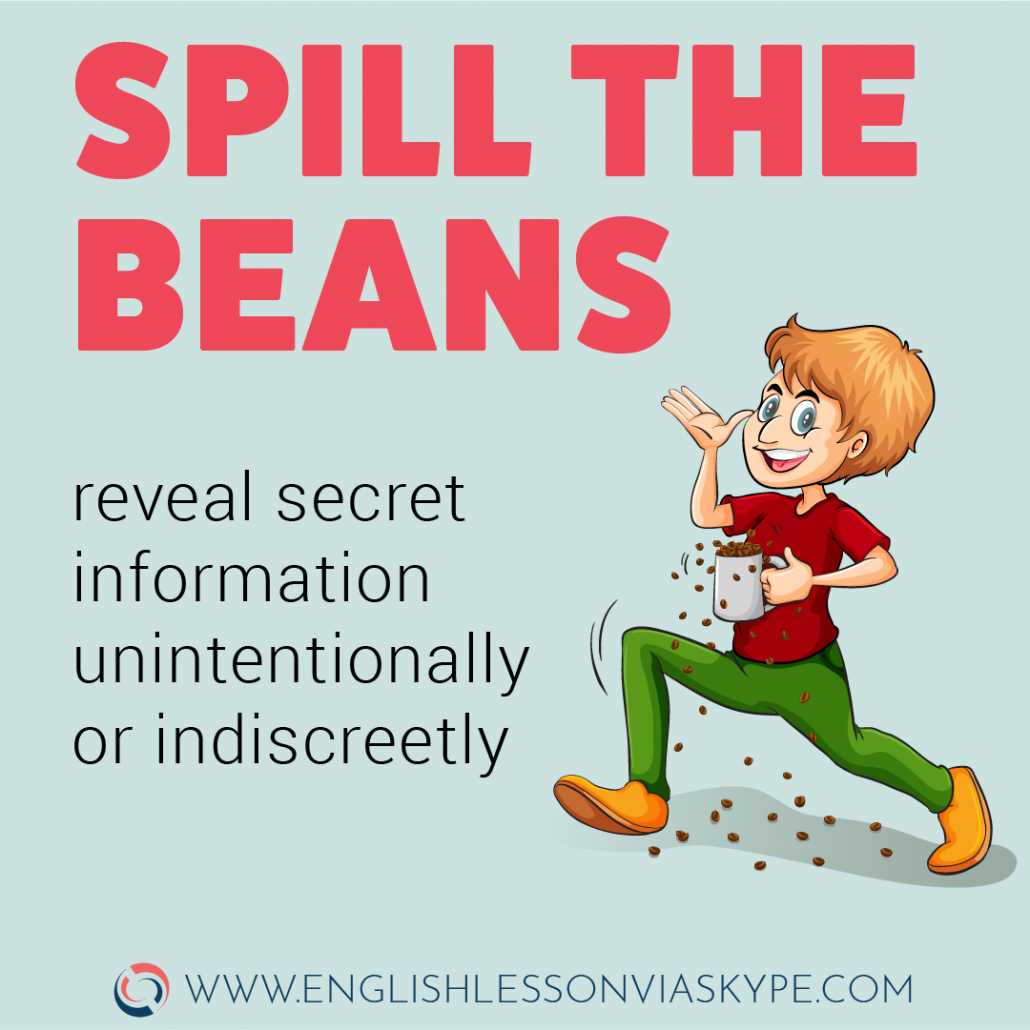Here are some English Food Phrases and Idioms for advanced English learners.
We all love food. We love eating it of course but we also like cooking it and talking about it.
There are many English expressions linked to the theme of food. Of course, they are metaphorical meanings and have a very different meaning than the food items that they may refer to.
Scroll down to watch a video lesson.
Table of Contents
Harry
English Food Phrases and Idioms

Share and help other students to improve English skills
as easy as pie
When we are planning a task or have a job to do perhaps that we are not looking forward to someone may tell us “don’t worry it won’t take you long, it is as easy as pie”. (this expression has a similar meaning to a piece of cake – something is easily achieved)
A pie is a very popular and common dish in England.
Pies come in all shapes and sizes and are made with different ingredients. We have fish pie, shepherds pie and steak and kidney pie which the most well known. (this expression has a similar meaning to a piece of cake – something is easily achieved).
My favourite has always been Shepherds pie! If I can cook it anyone can!
Intermediate to Advanced English Marathon

INSANITY: doing the same thing over and over again and expecting different results.
Albert Einstein
- What you'll learn:
- better understanding of more complex grammar structures
- advanced English vocabulary words
- British & American slang
- perfect your listening skills through practing different accents
- This marathon is for you if you're:
- stuck at an intermediate English level
- tired of confusing explanations
- a mature student
- shy & introverted
What does Apples and Oranges Mean?
In this short video English lesson you will learn what does idiom Apples and Oranges mean in English.
Share and help other students to improve English skills
English Food Phrases and Idioms
the apple of one’s eye
When someone has a favourite person (for example, a child or grandchild) who they are very proud of and always happy to see, we refer to this person as the apple of one’s eye.
Example:
The grandfather had four grandchildren. Two boys and two girls. He was fond of all of them but the first born grandchild was his favourite and he always told her (Mary) that she was the apple of his eye.
spill the beans
Meaning: to reveal a secret or confess to something
Example:
Don’t tell her, because she’ll spill the beans to everybody.
Beans are a favourite food of many. Easy to make. Tasty to eat and cheap to buy.
However, if you drop them or spill them it can be a little bit messy (tomato sauce everywhere!)
So when someone has a secret or some information that we really want we keep asking them to tell us. We ask them to “spill the beans” or give us the information.
We constantly urge them (encourage them):
Come on, spill the beans, you know you want to!
full of beans
Still on the theme of beans. Lots of food is well known for giving us energy. Beans in particular offer one of the best sources of energy.
If someone is full of beans, it means they are full of energy, they are very active.
Example:
When children are jumping and running and screaming and shouting we often hear the parents saying: “Don’t worry, they are full of beans”.
to butter somebody up
Sometimes it is difficult to persuade someone to do what you want them to or to get them to agree to your request.
To help we often have to find their “good side” (something that will help in persuading him/her more easily).
Often praising them or flattering them works quite easily and we refer to this as buttering them up (like putting lots of butter on toast; it makes the toast very smooth).
Example:
Juan wanted Ana to cook his favourite meal (paella). Ana said she was busy and did not have the time. Juan told her over and over again that she was a great cook and her paella was well known to be the best in the family. “Come on, you know your paella is the best. Let’s have a beautiful evening paella, wine and music”. He continued this for several minutes until she eventually agreed. His buttering up had worked. He got his paella.

English Food Phrases and Idioms
have a finger in the pie
Meaning: to have an interest in something or to be involved in something, particularly if your involvement is not wanted
Example:
He was so anxious for the project to do well that I knew he had a finger in the pie.
have your cake and eat it
We all love cakes. The sweet taste of rich chocolate or gateaux is a very warm experience. To have your cake and eat it is used when somebody wants everything.
Not happy with one thing he/she wants it all.
Example:
Michael had been asking his boss for many months about promotion. When finally his boss called him in and told him he was being promoted he was of course very happy. However, he immediately asked for an increase in his salary and a company car. His boss was a bit surprised. “You really want your cake and eat it don’t you.”
to be in a pickle
When we want to preserve some vegetables (like cucumbers or onions) we often use vinegar. These are then referred to as pickled.
We all have difficulties at times in our lives. Some are more difficult than others. When we have a problem that is not easy to solve we say “oh we are in a pickle here.”
Example:
David had a problem. He had lost his job and needed to repay his bank loan. He owed them money for his car loan. He phoned his father to see if he could help. “Dad sorry to ask but I am in a bit of a pickle. I lost my job and need to repay my bank . Could you help for a few weeks please?”
More Information
For more information on useful English expressions, English Phrasal Verbs and English Grammar Rules, check out the following links:
English Expressions about Success
Free resources are always available at BBC Learning English.
You will love these English lessons

10 English Verbs Related To Time Management
Learn English verbs related to time management. Speak about time management in formal and informal conversations. Listen to the podcast


20 Advanced English Adjectives For Fluency
I’ll be giving you 20 advanced English adjectives for fluency. This English lesson is useful for students studying for IELTS,


Asking for and Giving Permission in English
Asking for and giving permission in English, these useful phrases will help you improve your speaking skills. Polite formal requests